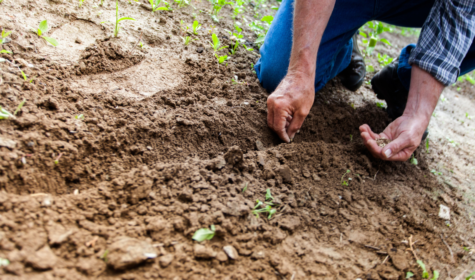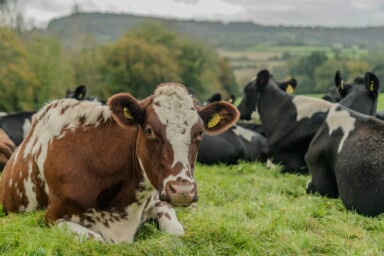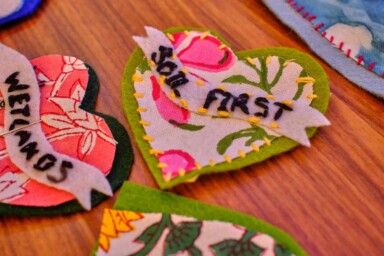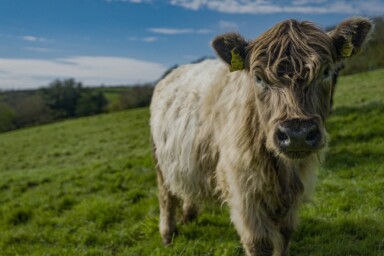As a new entrant farmer, I didn’t think I’d be producing food this year.
My partner and I are out in West Wales and have been laying the foundations – literally and metaphorically – of a new small farm.
Transforming 12 acres of pasture previously used for haylage and the occasional weeks of grazing, we’ve set about planting a mixture of native hedgerows, coppice woodland, a wildflower meadow, fruit and nut orchard and the beginnings of a small market garden for our fermented food business.
After years of research, travelling and self-directed learning we’re now doing it for real.
We expected to start growing next season after a year of infrastructure development whilst holding down other work, one of which is with the Ecological Land Cooperative (ELC).
But then the world changed.
The COVID-19 pandemic has focused the mind, and in the context of the UK, raised pressing questions about food security and food resilience – questions now asked by everyday folk as we see an uptake of veg box schemes and backyard growing becoming more vigorous, while farmers of all types are working flat out to meet demand for food.
I’m immensely proud to be working for the Ecological Land Cooperative — the only national organisation in England and Wales that works to secure residential small farms for ecological land use.
As one half of the communications team, my role is to articulate and explain what it is we do and why, as an organisation, we believe that ecological farming is not only possible but necessary. As we find ourselves in these strange times, the need – and urgency – to produce good, healthy, local and ecological food is increasingly apparent.
The ELC is in the throes of a Community Share Investment Offer. The Offer has garnered over half of the £400,000 target, which is both incredible and telling. In search of solutions, the ELC provide a practical and viable route for new entrant farmers.
The ELC’s first project, Greenham Reach in Devon, was granted temporary planning permission in 2013 and now has permanent permission with three flourishing small farms and businesses who have changed the landscape, by benefiting the natural world and producing local, ecological food and medicine.
‘Steepholding’, one of the three farms at Greenham Reach, is working incredibly hard to provide locally grown food delivered to local people through their veg box scheme which has seen a huge surge in demand. Their response to the crises has been great: to increase production as much as possible – but ultimately to continue doing what they’ve always been doing. Producing good food for the local community is part of what, in my opinion, a resilient food system should look like.
The ELC’s second site in East Sussex secured temporary planning permission with new entrant farmers moving on site in autumn 2019 and finding themselves – after the wettest winter and four named storms later – setting up their farms in the middle of the coronavirus outbreak. Their response? Get stuck in, grow more food.
What is the Ecological Land Cooperative?
The ELC is a quietly radical organisation that punches well above its weight. It does this by challenging the twin barriers that face new entrants to farming – high land prices and planning consent (legal permission). ELC farmers are provided with permission to build their own sustainable home with off-grid utilities and road access, while establishing their farm business. Applying for planning permission for agriculturally tied, rural workers’ dwellings’ enables a new generation of agroecological farmers to thrive and survive on the land, having not been priced out of rural living and working.
The beginnings of the ELC took place in 2009, around a pub table, with thoughts scratched on the back of an envelope. Like many good ideas it began with a ‘Wait, I wonder if…?’
As a group of activists who had enough of raising their voice to say ‘NO!’ at the plight of small farms, the destruction of the countryside and the abuse of power, the nascent organisation imagined what it might look like to engage with the planning system and create a new model of land stewardship based on agroecology.
This drive came from the frustration felt at meeting people who wanted to develop ecological land-based livelihoods but faced huge obstacles. Entering into planning battles and managing to afford the high cost of land was hard enough, let alone starting a land-based business in an empty field.
The central idea of the co-operative was that it would retain the knowledge around planning and use it again and again to help the many people with land-based skills and the commitment and passion to get on with the business of growing, hit the ground running, as it were. The Coop would put in planning applications on behalf of such ecological enterprises and establish key shared infrastructure on site (barn, energy and water) and along the way offer material support and conceptual design ideas.
In times of crisis, the just-in-time production lines of supermarkets reveal the fragility of our globalised food system. As an island, the UK produces around 50% of the food we actually consume says Tim Lang, professor of food policy at London’s City University. The easy accessibility of food, Lang says, reveals the realities of long and complex food chains, heavy fossil fuel use and exploitation of workers in faraway places.
Lang’s call for the Agricultural Bill to be scrapped and replaced with a ‘Food Security and Resilience Act’ has caused alarm among many environmental groups who are concerned that the focus on food would wipe out the precious few steps made in terms of conservation.
But it needn’t be a simple binary. Ecological agriculture, as demonstrated by the farmers on ELC land, show that ecology and food production can sit side by side.
The aim of the 2020 ELC Share Offer is to develop more sites, with a target of creating 18 new small farms on six new sites by the end of 2023. Pushing for the recognition that ecological agriculture is a serious and practical way to address our climate crisis, rural underdevelopment and importantly, getting new entrants into farming and increasing UK food production, the Ecological Land Cooperative model addresses many of the issues we are currently facing.
To find out more about the ELC and to place shares, please visit: https://www.ethex.org.uk/elc2020






